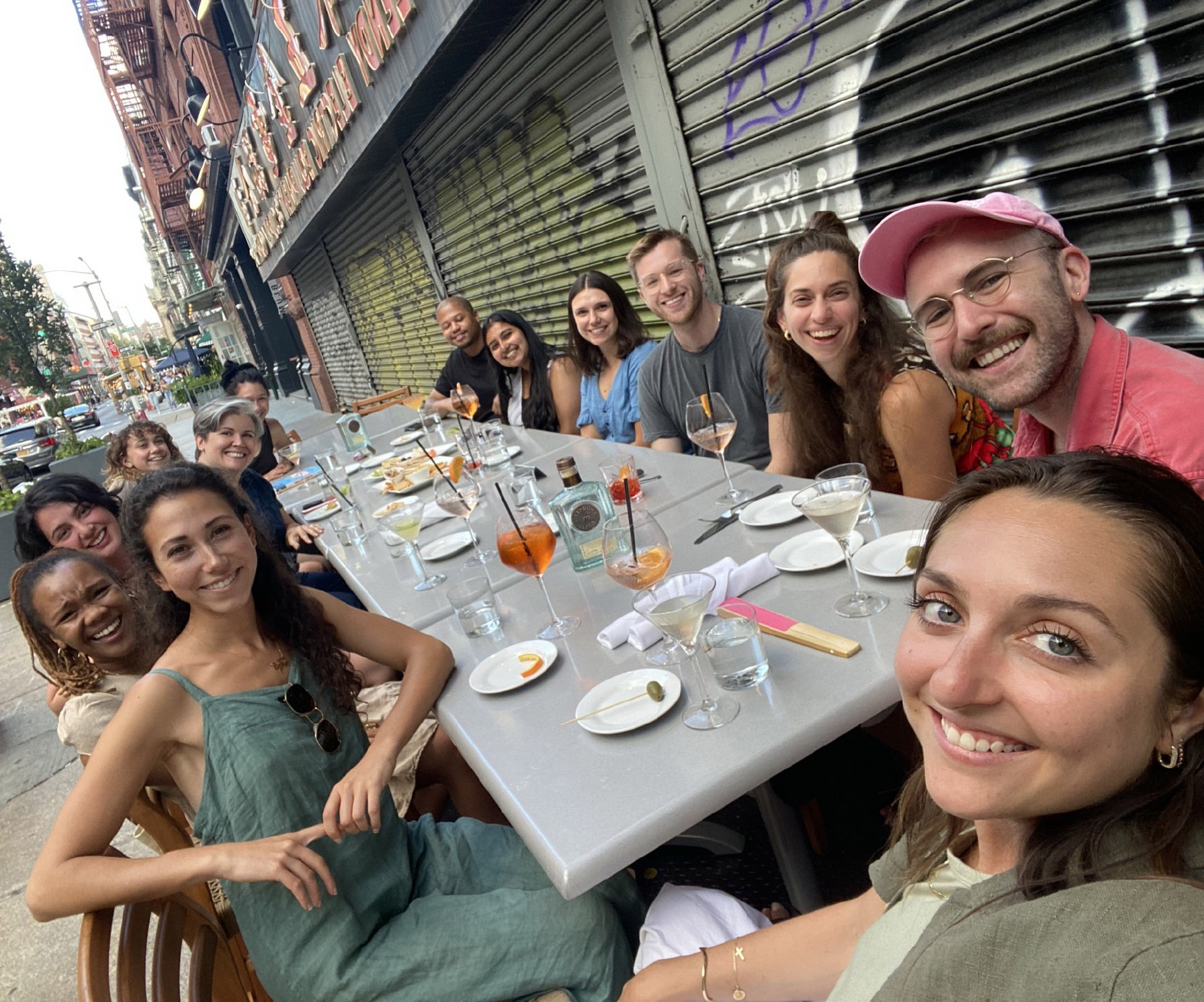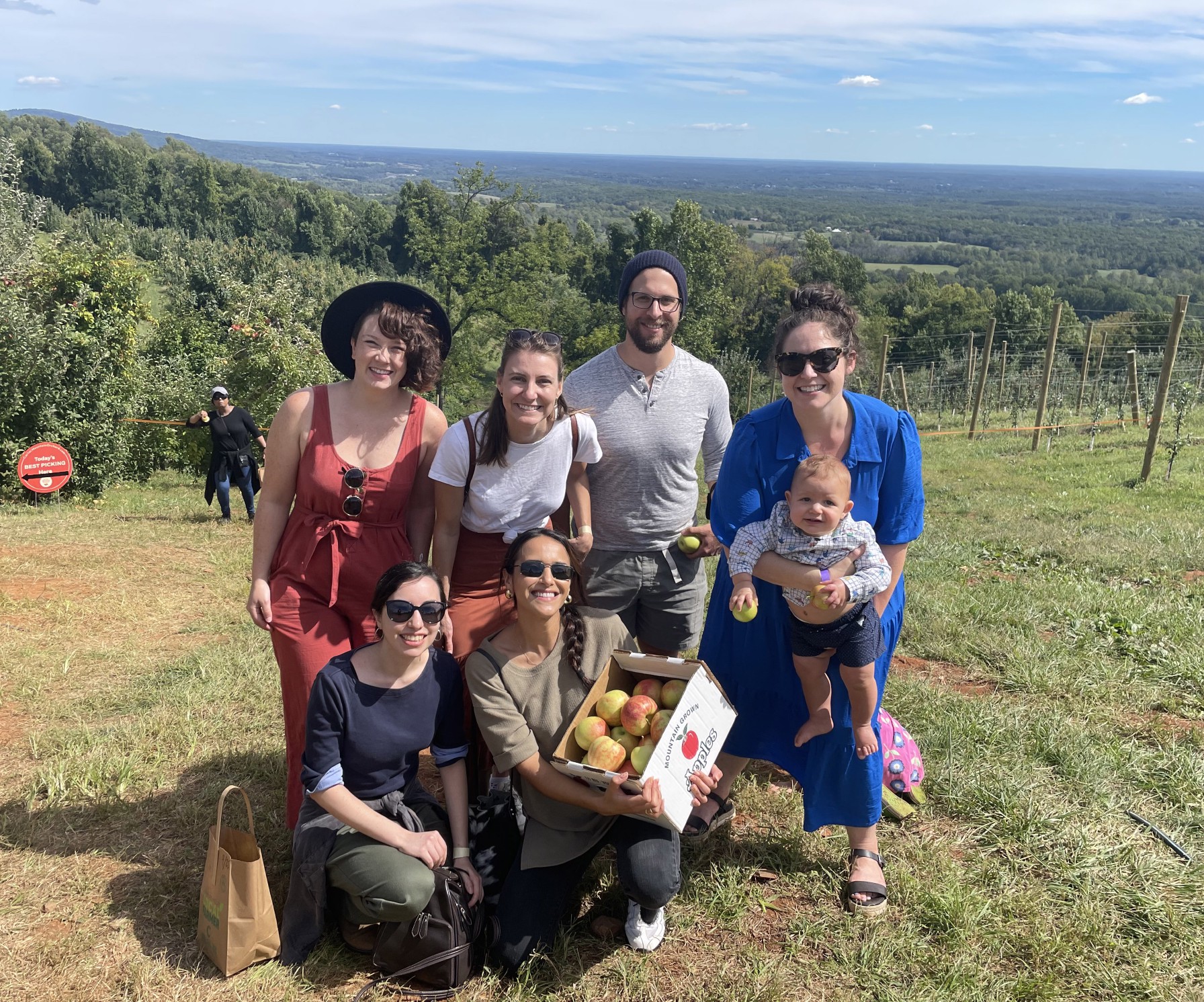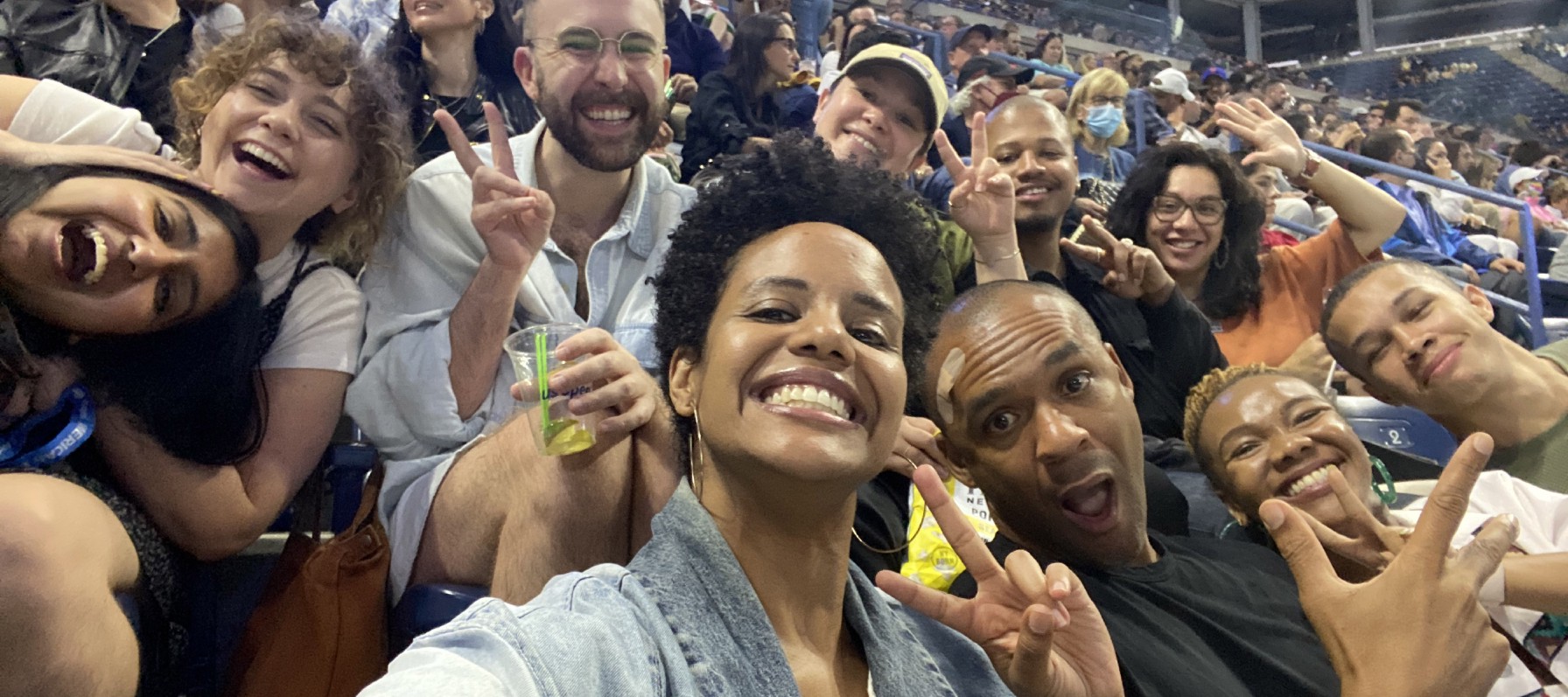01
A Time for Progress
It’s as true for private companies as it is for democracies: our
Over the past 18 months, we’ve seen what happens when that patience
Blame it on the pandemic, a global social reckoning, widespread unemployment, or toxic conspiracy theories. Any number of stressors on our system could have been the final straw, or perhaps it was the cumulative weight of so many crises occurring at once.
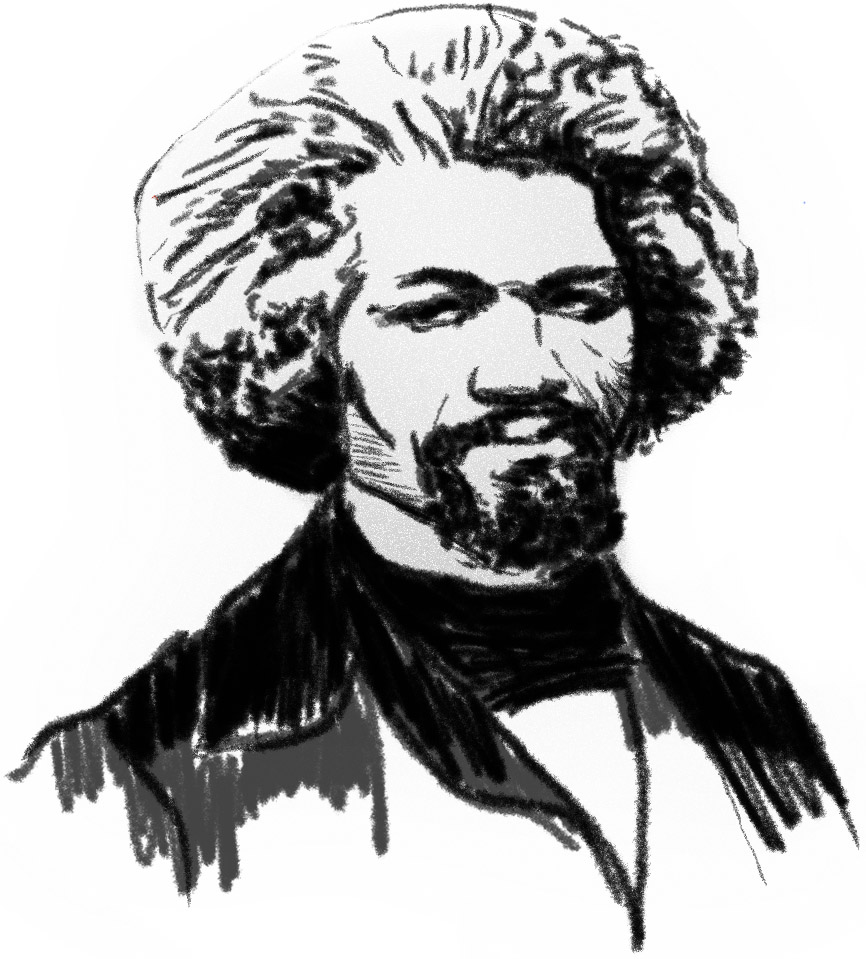
“If there is no struggle, there is
no progress.” Frederick Douglass
The past year has been a wild ride, to say the least.







But whatever ultimately triggered our collective exasperation, the message to those of us in positions of influence is clear: the time for progress
is now.
At SYLVAIN, we have long prided ourselves on being a progressive organization that leverages the might of corporations to benefit the greater good. That sense of responsibility informs who we are, what we do, and why we exist. From race to health to the environment, SYLVAIN uses innovation, brand strategy, and organizational design to address the challenges
of today.
We firmly believe that no person of integrity and conscience could emerge from this tumultuous era unchanged. That also goes for us as a company, and, we believe, our entire industry. Over the past decade, many of the world’s largest consulting companies have launched lucrative CSR, DEI, and ESG practices, talking the talk of social progress in pursuit of accelerated growth. While these practices may contribute to real social and environmental progress, they are also profoundly out of proportion to the influence our industry yields over the ills that plague our culture and our environment. Social justice, sustainability, racial and gender
In short, the consulting industry can, and must, do better. And that includes SYLVAIN. Social progress has always been a goal and an animating force behind the work we do. It’s why we became a
While the distance between our current reality and the honest realization of our principles may be vast, we are fully aware of that gap and motivated to do something about it. We are committed to progress, for ourselves and our clients, and to promoting an understanding
Social justice, sustainability, racial and gender
equality— these goals must inform all the work we do, not just serve to fuel additional revenue streams.
The distance between the present
We call this distance a
Progress Gap. A concept that rewards current progress and creates momentum for future progress.
and our ideal future.
02
The Consulting Industry at a Crossroads
ESG consulting has been a windfall for the industry. But a gold rush attitude is hurting clients
Given the distance we have to travel, and the rapidly dwindling time we have to get there, it is no longer morally justifiable for the consulting industry to remain
It is to the industry’s credit that we long ago recognized we had a role to play in the ESG, CSR, and DEI movements. When ESG investing started becoming a significant factor in global markets, a handful of
But a decade later, as concerns over corporate governance metrics have moved from Wall Street to Main Street, socially responsible consulting, for lack of a better term, has grown from a niche market into a veritable gold rush, with consultancies practically tripping over themselves to launch specialized practices and partnerships that promise to help companies put sustainability, social justice, or diversity “at the core of their business.” Not surprisingly, in their rush to capitalize on the opportunity, some consultancies are making false claims about their own track records to establish their progressive bona fides and differentiate themselves from the competition. Others think nothing of promoting themselves as
It’s easy to dismiss such violations as the proverbial gambling in the casino. Anyone who put their faith in global consulting firms to bring about a golden age of sustainability, diversity, and social justice probably wasn’t too familiar with the industry to begin with. But hypocrisy and exaggerated credentials may ultimately pale in comparison to more insidious ills that have infected the industry. Namely, laziness
How does the epidemic of off-the- shelf solutions take advantage of clients and harm the public?
An Epidemic of Off-the- Shelf Solutions
Today, far too many consulting companies are offering
Such insincere efforts not only take advantage of clients, they ultimately harm consumers and weaken the overall drive toward social and environmental progress.
Consider the number of high-profile CSR executives who have recently gone public with their belief that ESG reporting
The focus on reporting may actually be an obstacle to
progress— consuming bandwidth, exaggerating gains, and distracting from the very real need for changes in mindsets, regulation, and corporate behavior.
But hypocrisy and exaggerated credentials may ultimately pale in comparison to more insidious ills that have infected the industry. Namely, laziness
and greed.
Not a Game to be Won
We point out these failings not to suggest that we at SYLVAIN have sidestepped them, or that we have found a better way. Or even that we lament more than other
Like the industry at large, we must start by making internal progress before rushing to sell new
This is an opportunity for all of us to transform and revitalize a mature industry at risk of decline. In 2013, Clayton
We work in a competitive industry, but sustainability, diversity, and social responsibility are not games to be won. Approaching this the right way means doing the work internally to make sure that we are nurturing the right mindset in approaching these big challenges and we are positioned to respond to them effectively. How we respond to this demand will have tangible,
Before we can help our clients reorient toward progress, we need to take a hard look at how we operate and the impact we’re having on our culture and society. The heart of this report is a framework designed to help us (and any consultancy) assess our own progress so we can embody the change we hope to inspire. We believe that, in the end, our consultancy, our clients, and anyone in our industry who ventures to ask themselves hard questions will be better off
See how our work with Twitter made online conversations more inclusive.
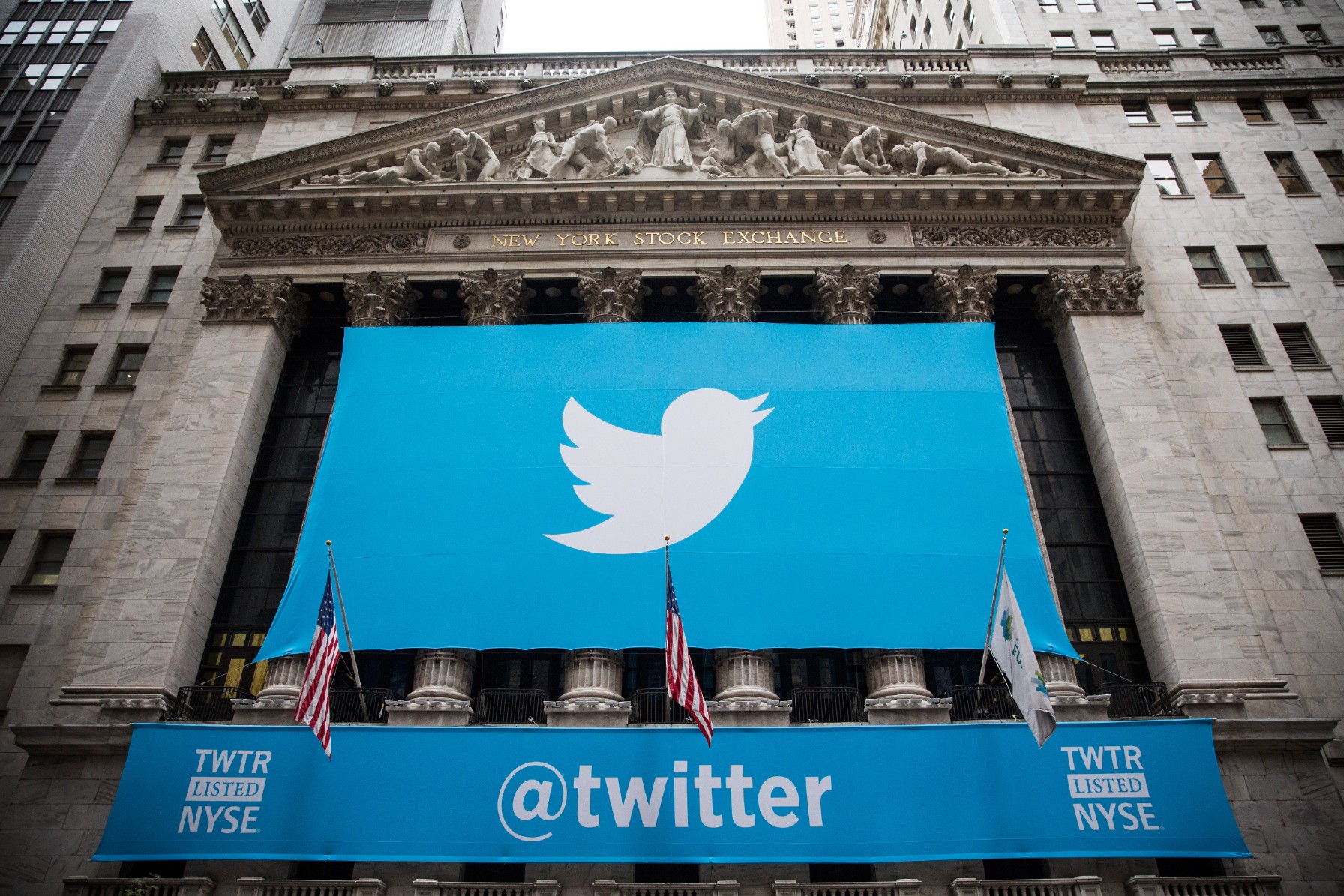
Read More About Twitter
The Future of Healthy Communities
The rapidly evolving world of technology is rife with both rich opportunities and devastating consequences for society at large. So in September 2020, Twitter’s research team wanted a deeper understanding of how their members and moderators influenced the creation of healthy online communities. All in an effort to answer one of the most
They developed a
Before we can help our clients
re-orient toward progress, we need to take a hard look at how we operate and the impact we’re having on our cultureand society.
03
We Are Big for Our Size
SYLVAIN may be small compared to our competitors and clients, but our influence
SYLVAIN is a microscopic piece of the overall consulting industry. But with our size comes significant advantages. We are nimble enough to thrive at the chaotic intersection of business, marketing, brand, social impact, and, of course, broader culture. And we have the flexibility to offer solutions based on our clients’ needs rather than our own menu of expensive tools and practices.
Learn how we infused social impact into Uber’s business strategy based on its unique needs.
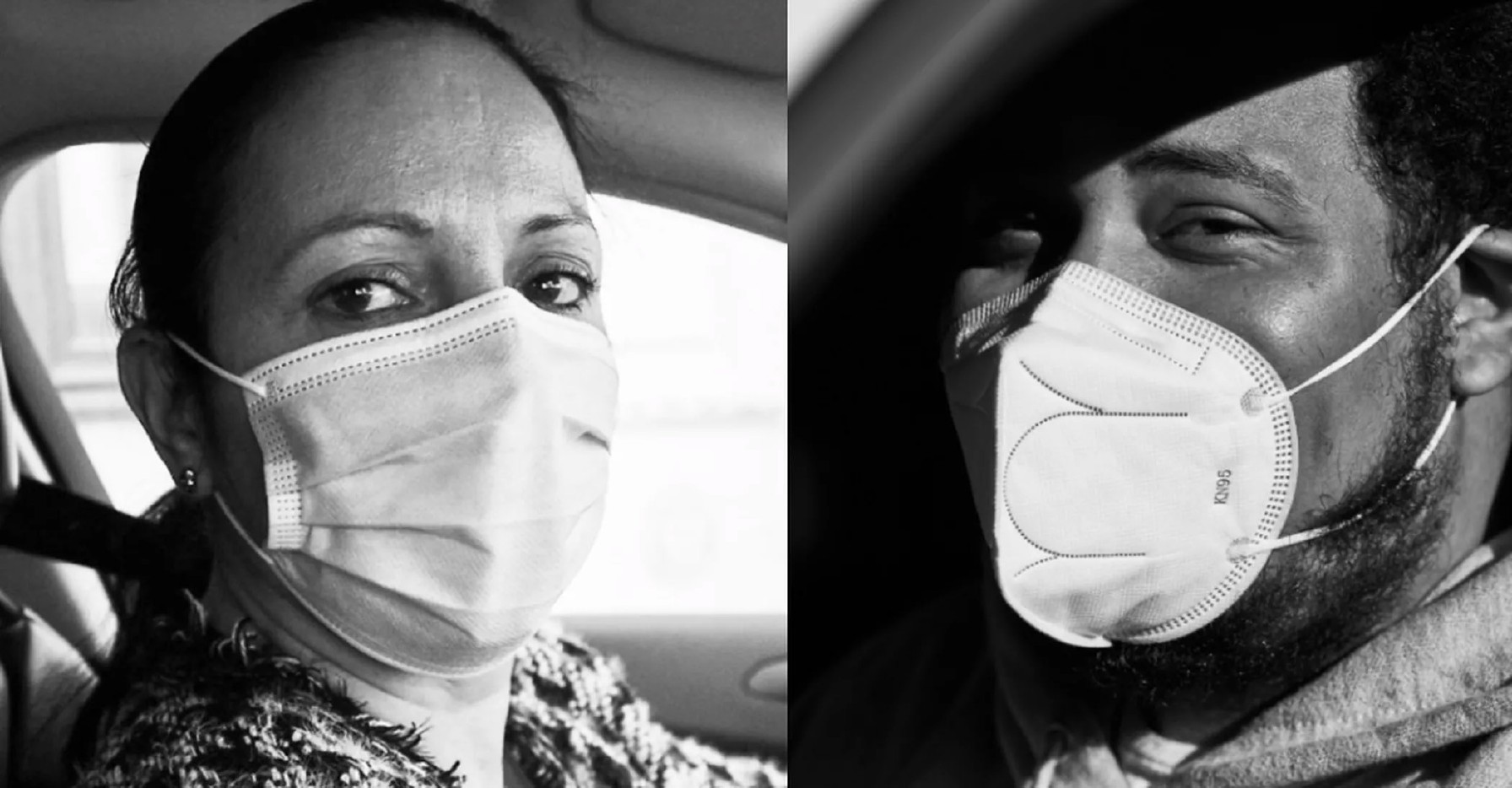
Read More About Uber
Infusing Social Impact into Business Strategy
Today, all brands are under intense scrutiny. Tech companies in particular often face criticism, warranted or not. Uber has been criticized for
We uncovered the key issues affecting Uber’s triple bottom line, ultimately developing
A look at our physical footprint relative to
the larger players puts our size difference instark perspective .
Employee headcount
- SYLVAIN Compared to Google
- 75 vs. 135,301
Our revenue is a fraction of what the large consultancies are earning. In 2020, McKinsey’s revenue from
Covid- response consulting was five times our total earnings for the year. In fact, most of our clients dwarf us in terms of revenue, too.
What we make compared to our clients and competitors
Amazon
Accenture
AMEX
Netflix
BlackRock
Diageo
McKinsey
NYTimes
IDEO
Sylvain
However, because some of the world’s top brands entrust us with their most sensitive and critical projects, our influence vastly outweighs our footprint. SYLVAIN provides guidance that affects the lives of millions of people around
the world every day, and our influence has only grownover time.
With a 100%
We see our size as neither an impediment nor a disadvantage. We believe that being smaller provides us with certain opportunities and freedoms that larger, more entrenched players cannot afford. We are frequently approached by clients to handle challenges that require a more personal and sensitive approach than they believe they will get from larger consultancies, and it is a point of pride that we are consistently able to design solutions to these challenges that benefit the client, our agency, and most important, the culture
See how our work with the WNBA lifted viewership and elevated muted voices.
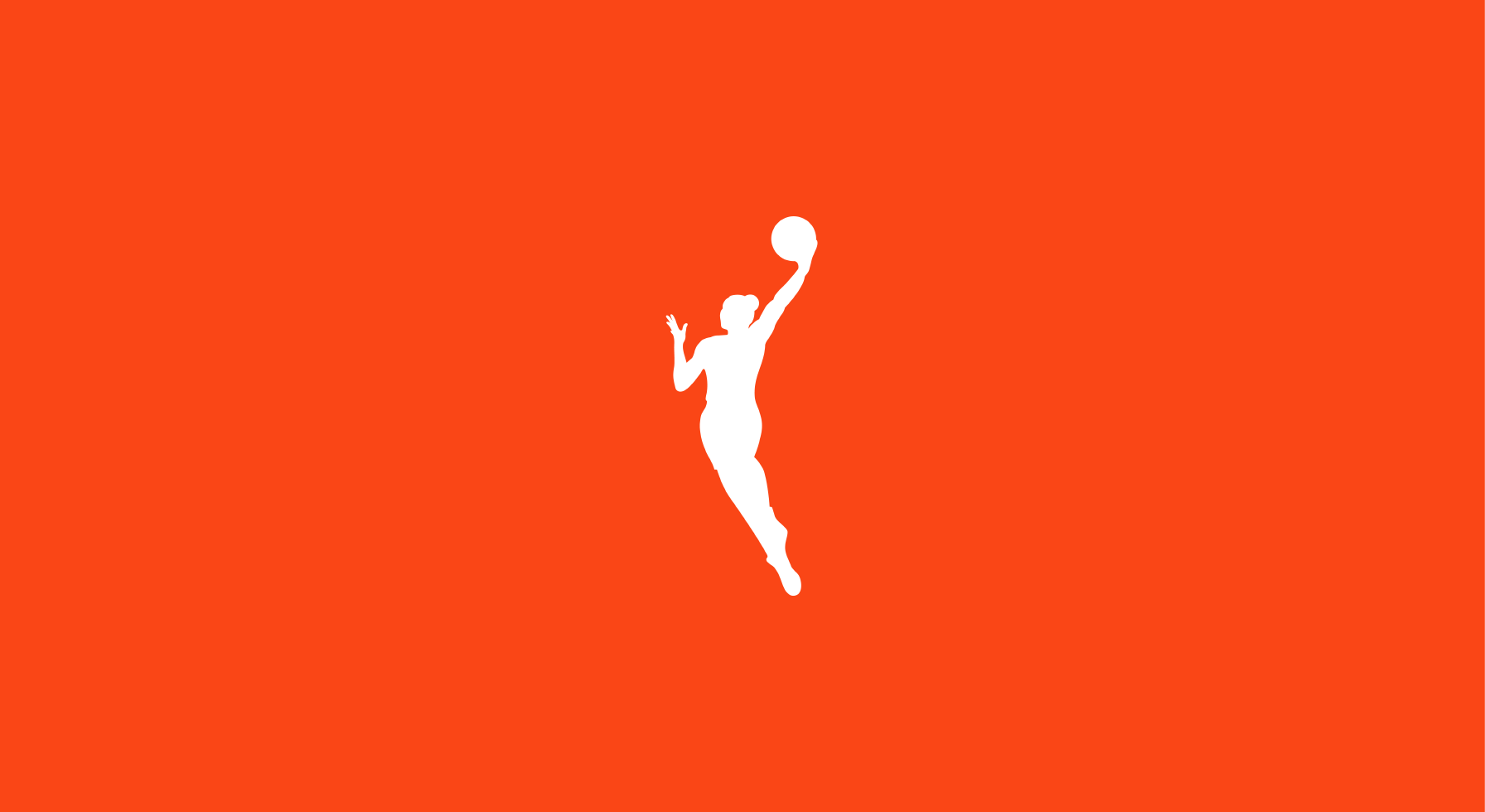
Read More About the WNBA
Leveraging the League’s Mission To Empower Women
In 2019, we worked with the WNBA to assert the league’s rightful place in culture. We saw this as much more than a chance to promote a sports league. As a brand that is deeply relevant to millennial women of color and their allies, the WNBA had an opportunity to elevate muted voices and have a tangible social impact. We designed a new brand identity that centered and celebrated that audience, which created an energy and urgency to live out the League’s mission. Since then, viewership rose 64% the League’s Instagram followers doubled, and most importantly, the WNBA doubled player salaries and increased benefits, becoming a model for empowering female athletes around the globe.
It was a too-uncommon example of a project that was an unalloyed good, an effective effort that aligned with SYLVAIN’s values, achieved the client’s goals, and made people’s lives better.
None of this is meant to suggest that we have figured out how to fully operate as public servants. We’re still a work in progress. And we have a long
way to go.
Like any sizable organization, SYLVAIN is a company filled with contradictions, a group of people with good intentions in complex circumstances. We are
This report is part of our process for finding and operationalizing the answers to these questions. It includes our approach to progress within and beyond our own walls. Perhaps most important, it is designed to offer the core knowledge and tools we’ve garnered in our attempt to generate progress thus far, and
Our goal is to publish A Developing Story regularly moving forward as a way to continue embedding progress in the heart of our company, to operationalize our own
04
So, How Did We Get Here ?
We’ve always been oriented towards progress, but a few moments compelled
A Funny Thing Happened on the Way to Extinction
In the summer of 2020, Sylvain Labs, as we were still known, was facing extinction. In the face of the pandemic, our clients had canceled or postponed nearly all their significant projects, and our new business prospects had dried up completely. We had managed to keep our team intact by reducing salaries across the board. But the situation was unsustainable. We needed work,
In the aftermath of George Floyd’s murder, we began receiving briefs from all kinds of companies looking to increase their outreach to people of color. Unfortunately, what we saw was as disappointing as it was
A Blast from the Past
As we were grappling with this dilemma, we received an unexpected sign from our younger selves in the form of a breaking news alert.
Several years ago, one of the world’s largest consumer packaged goods
Now, in the face of global demands for racial justice, that company was making headlines for doing precisely what we had recommended. This very old, very successful brand would be permanently retired, to the relief of many (and the righteous consternation of others).
To the world, it was an acknowledgment that harmful portrayals of
To us, it was a reminder that our humanity and our conscience were a core part of the service we offer to clients. That there was no place in our business for simply being “yes people,” and that we built this company not to be bystanders but stewards of a better, more equitable
What we saw was as disappointing as it was
eye- opening. Far too many of the briefs were overwhelmingly performative, tone deaf, or simply insincere.
There is no place in our business for simply being “yes people,”
From Bystanders to Stewards
instead, we must be stewards of a better, more equitable society.
A New Perspective
With our commitment to our longstanding principles renewed, we passed on all but the sincerest and most potentially impactful projects we had before us. And while Sylvain Labs returned to profitability by the end
But we walked away from that moment with more than a temporary reacquaintance with our humanity. We walked away with a validated sense of our mission, our value, and what we owe to our clients. We remembered that while our clients help pay our bills, it’s the public that ultimately benefits from or bears the brunt of our work. In that regard, we must recognize our role as public servants and always keep in mind the impact our work may have on the most vulnerable and defenseless members of our society.
See how we helped PGE bring
eco- friendly services to low-income areas.
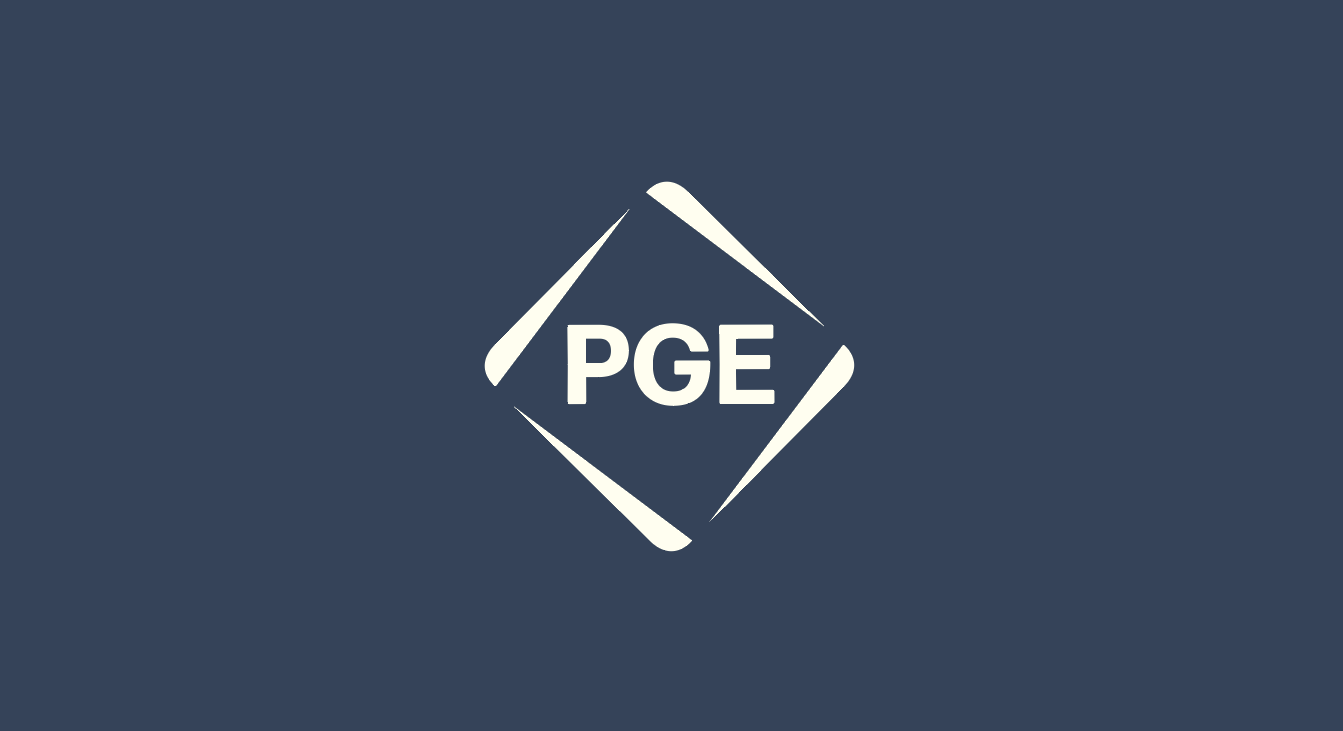
Read More About PGE
Piloting Customer- Centric Innovation
It is critical to ensure that society’s essential services (electric, gas, and water) are as efficient and accessible as possible. So when we worked with Portland General Electric (PGE) to develop a new approach to
We collaborated with PGE’s team to develop a set of innovation priorities that customers found most important and a toolkit to put them into action. As of Q2 2021, PGE is taking many of these new services to market. A successful rollout would affect energy distribution across Oregon, significantly improving both the resilience of their energy grid and the accessibility
Like most consultancies, we will never be confused with a charitable organization. But as advisors to the world’s most powerful companies, we are very much stewards of the public trust. As such, it is our moral obligation to work with our clients to align the actions of
See how we drove greater cultural relevance for The Museum of Modern Art .
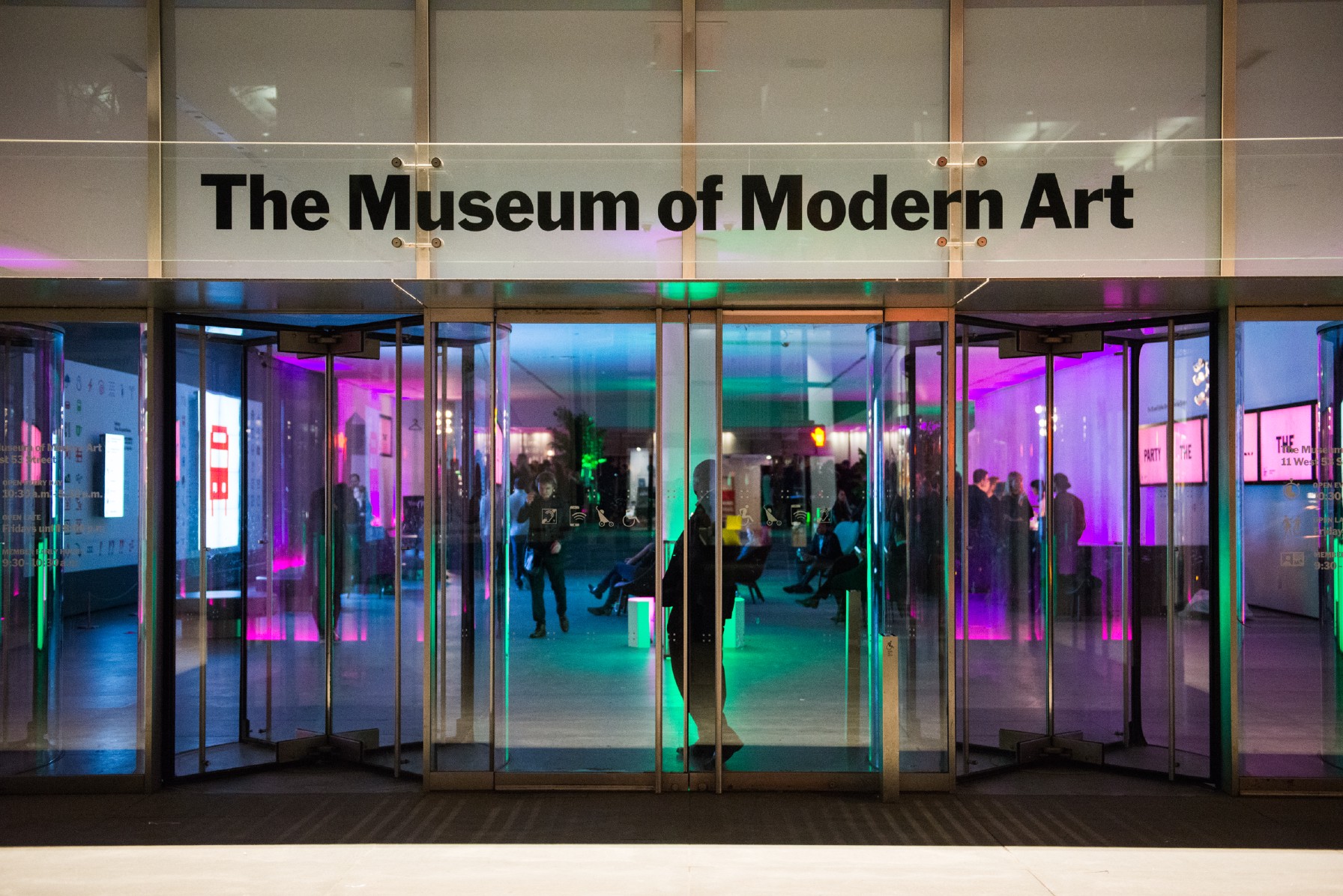
Read More About The Museum of Modern Art
Increasing Audience Focus at MoMA
Established, legacy organizations have immense potential to positively influence society at large. We immediately recognized this when we worked with the Museum of
We developed a brand platform to serve a new,
We consider ourselves lucky to have made it through when many others closed their doors or significantly downsized. And, while luck undoubtedly had something to do with it, we also credit these
In the next section, we will look at how those decisions have helped us codify what it means to be a
But we walked away from that moment with more than a temporary reacquaintance with our humanity. We walked away with a validated sense of our mission, our value, and what we owe to
our clients.
05
A Framework for Accountability
How do we embody the five character traits that define
We asked ourselves:
- Is the nature of our products and services in alignment with our values
and beliefs? - Do we actively track progress metrics across the
entire business? - Do we use the influence of our clients for
the better? - Do we consider the harm potential in all of our
project briefs? - Do we contribute to our community in a
meaningful way? - Do we constantly iterate
on our approachesand processes? - Do we provide opportunities for substantive
employee growth? - Do we have equitable representation?
The decisions we made during the darkest days of 2020 are now helping us forge the vision of the company we hope to become. By reflecting on those decisions and the lessons we learned from enacting them, we have come up with five character traits that we believe are essential to being a
It is worth noting that we have chosen character traits rather than specific principles or values to guide us in our journey. While there are many principles that we, as an organization, wholeheartedly
However, by adhering to character traits rather than principles, we keep the focus on our actions and our intentions rather than projected outcomes. Character traits are inherently human and expressed through our choices, whereas
In short, by adopting these character traits, we hope to keep our moral compass properly aligned ensuring that we will ultimately act in accordance with our collective principles.
Five traits for progress- guided consultancies
Just
Adherence to a set of standards, applied equally throughout the organization, that guarantees equity, inclusion, and opportunity for all employees and stakeholders.
Open
A commitment to transparency, honest communication, and a work environment that is responsive to
employee needs.
Compassionate
Radical consideration of all people, communities, and ecosystems impacted by the company’s operations.
Discerning
Thorough and formalized deliberation of every brief’s potential for societal harm or benefit, and alignment with
company values.
Consistent
Systemized processes, workflows, and measurements around progress across all facets of
the business.
Today, we are actively working to embed these traits throughout our organization. Ultimately, we hope that they will guide and inform every decision we make. In this graph, we have drilled down on each trait, defining it, breaking it down by its various components, providing the proof points by which we can judge our adherence to them, and finally listing which tools can best help
We have also developed a free, downloadable template of this framework and a workbook that others can use to begin instilling these traits in their own organization.
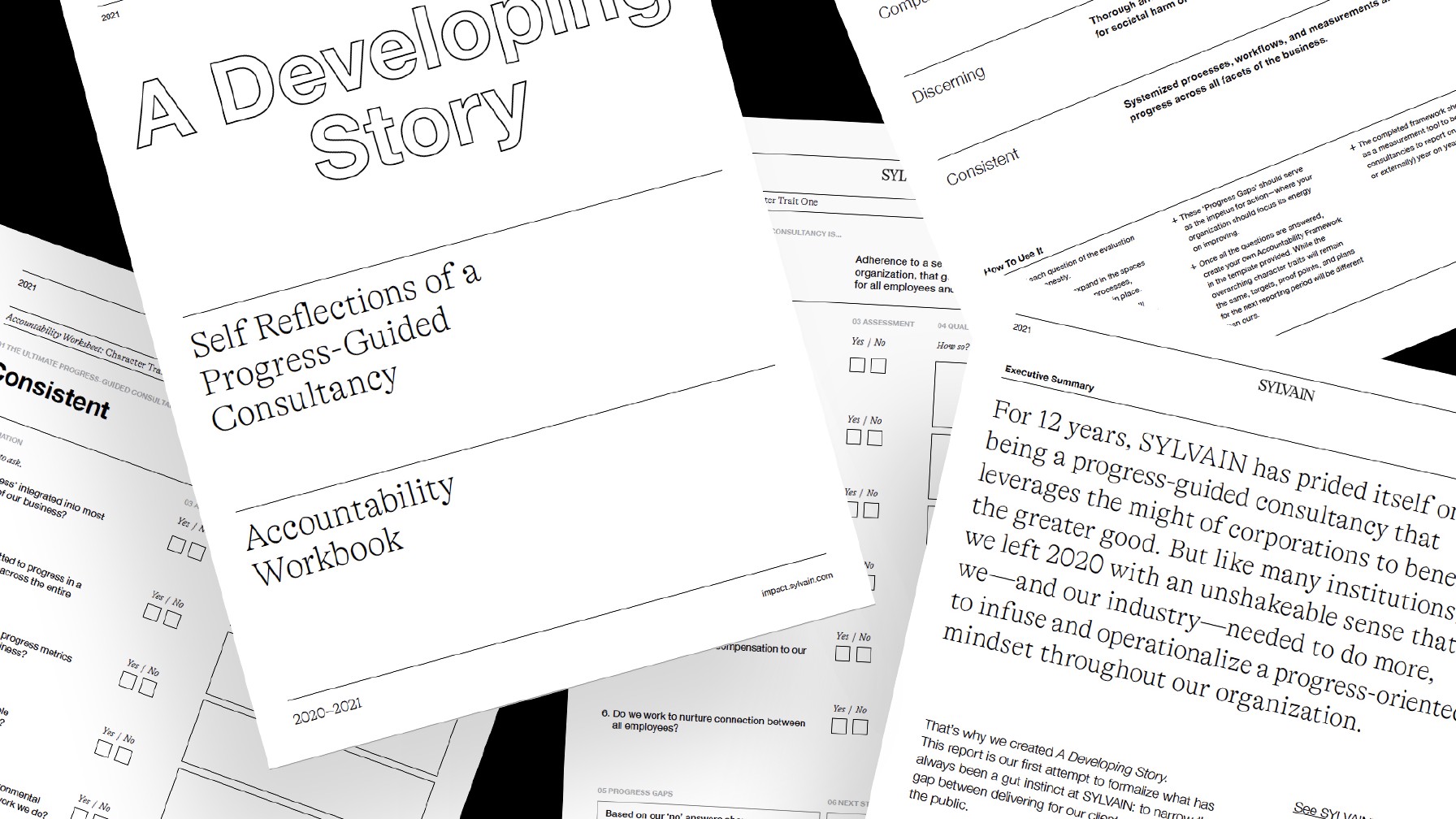
06
So What? Putting Our Progress Metrics in Context
Where are we succeeding, and where are we
Having identified the five character traits that make a consultancy
progress- oriented, we set about evaluating our own performance relative to each of those traits. The following graphic containsself- reflections from our CEO, Alain Sylvain. Below those evaluations, we have incorporated the results of acompany- wide staff survey and feedback fromour clients.
Evaluating Sylvain Against the Five Traits
Just
Adherence to a set of standards, applied equally throughout the organization, that guarantees equity, inclusion, and opportunity for all employees and stakeholders.
Our evaluation
We are highly diverse, respectful, and equitable and have resisted hierarchy except where needed for employee growth.
Though clients and staff praised our diversity and commitment to equity, one client said we needed to work harder to consistently integrate global perspectives.
Open
A commitment to transparency, honest communication, and a work environment that is responsive to
employee needs.
Our evaluation
SYLVAIN is an open, radically transparent, and flexible environment that values the honest exchange of ideas with staff, clients, and partners.
Clients appreciate our flexible and inquisitive approach to the work, though some team members noted that the pace or volume of work was sometimes in conflict with
Compassionate
Radical consideration of all people, communities, and ecosystems impacted by the company’s operations.
Our evaluation
We adequately donate, volunteer, and care for our staff. But we struggle to take care of freelancers and sometimes value clever solutions over virtuous ones.
Employees believe that SYLVAIN’s compassion is authentic, though some say it lacks focus or clear definition.
Discerning
Thorough and formalized deliberation of every brief’s potential for societal harm or benefit, and alignment with
company values.
Our evaluation
We have integrity at our core and rarely consider finances first, but we have no systems in place to evaluate briefs or clients for harm potential.
Some clients and team members expressed their desire to see a faster, more focused process for evaluating briefs, but none doubted the integrity of
Consistent
Systemized processes, workflows, and measurements around progress across all facets of
the business.
Our evaluation
We embody our values instinctively but have not operationalized them or reconfigured the business to enforce them in a
Clients and employees agree that SYLVAIN’s values are a matter of instinct and could be more effective if they were more consistently integrated into the company’s processes.
Only when we
07
Adopting the Accountability Framework
Does your organization embody the five character traits? Some questions
Ultimately, we believe that it is by holding
ourselves— both SYLVAIN specifically and the consulting industry morewidely— accountableto these five character traits that we can effectively steer the corporatesector toward meaningful progress.
The five traits in action
Just
Adherence to a set of standards, applied equally throughout the organization, that guarantees equity, inclusion, and opportunity for all employees and stakeholders.
Only when consultancies are JUST can we credibly compel companies to rewire their systems to institute social equity. The vast majority of companies are content with checking the box on D&I metrics, when
For brands, questions to consider
If you’re an existing or prospective client reading this, Hello! We thank you for taking the time to read this report, and invite you to honestly ponder: What discrepancies exist between your official DEI stats and your
Open
A commitment to transparency, honest communication, and a work environment that is responsive to
employee needs.
Only when consultancies are OPEN can we effectively compel companies to embrace transparency as a tool rather than a threat. Secrecy in the name of competitiveness (often enabled by us consultancies) plagues too many from identifying and embracing the right
For brands, questions to consider
Here’s another provocation for you. What aspects of your operations would you feel uncomfortable sharing with your customers and critics? Consider creating a
Compassionate
Radical consideration of all people, communities, and ecosystems impacted by the company’s operations.
Only when consultancies are COMPASSIONATE can we effectively compel companies to diversify priority measures of success. Without assigning financial value to select ESG metrics, companies will continue to prioritize shareholder value without regard for the social and environmental consequences.
For brands, questions to consider
Picture a board of directors made up of your most loyal customers, your most fervent civil society critics, and
Discerning
Thorough and formalized deliberation of every brief’s potential for societal harm or benefit, and alignment with
company values.
Only when consultancies are DISCERNING can we effectively compel companies to scrupulously introduce products and messages to the world. While consumption remains the vehicle for corporate operation, companies must use their products and services
For brands, questions to consider
Consider the seemingly improbable task of building your company through 2030, assuming that traditional
Consistent
Systemized processes, workflows, and measurements around progress across all facets of
the business.
Only when consultancies are CONSISTENT can we effectively compel companies to design exclusively for collective needs. If we have any shot at addressing the effects of climate change, all corporate entities will need to drastically transform their business models, from seeking to stoke personal desires to trying to solve our collective problems.
For brands, questions to consider
Send out a
08
Progress Gaps: A Grading System for 2022 and Beyond
Coming up with standards is the easy part. How will we hold ourselves accountable?
Since our founding in 2010, SYLVAIN has strived to become the best global citizen we can be. As we enter 2022, we are energized to continue that push with a renewed sense of purpose and the roadmap we have laid out here. While brands and other organizations have ESG and other established guidelines to hold themselves accountable, no such framework currently exists for consultancies. We hope that what we have proposed here can be a first step in correcting
that imbalance .
For SYLVAIN, our next step is living up to the standards we have proposed. As such, in 2022, we pledge to use the accountability framework to measure our impact and performance across every aspect of our business.
See how we plan to do this
What Are Progress Gaps?
We feel it’s important to establish a system that creates both rewards for current progress (where we’re doing well) and momentum for future progress (where we need to do better). Therefore, we’re introducing a concept we call Progress Gaps. For us, identifying these gaps is the core benefit of the framework.
Our grading system:
- Establish and measure proof points for every Character Trait component. Identify Progress Gaps across all components. (For example, where are we falling short on proof points? Where are we lacking a system to showcase proof points at all?)
- For each Progress Gap, set a target and related action plan with key proof points for measurement.
- Address progress in the next report.
Other questions to consider before our next report:
- Have new targets emerged over the course of the year?
- Do current targets require a
longer- term investment than we initially thought? - Have we failed to meet targets? If so, what have we done right, and how are we pushing to do better?
Our grading system, like this report, is designed to acknowledge our successes as much as our failures; like most organizations with high ideals, our story is a complex mixture of both. That’s why this report is titled A Developing Story. But we would not have undertaken this project if we didn’t believe progress was attainable. By the time of our next report, we hope that our faith will be validated.
As Albert Einstein once said, “Failure is success in progress.” At SYLVAIN, we expect to have many failures on our path to success. Still, we trust that with a little luck, perseverance, and
09
Accountability Workbook
So what’s next? Download the Accountability Workbook below. We hope this inspires your organization to craft a bespoke approach to operating as
The completed framework can serve as a measurement tool to be used by consultancies to report on (internally or externally)
We welcome your feedback. Please share your thoughts, concerns, and criticisms
More as our story develops…
